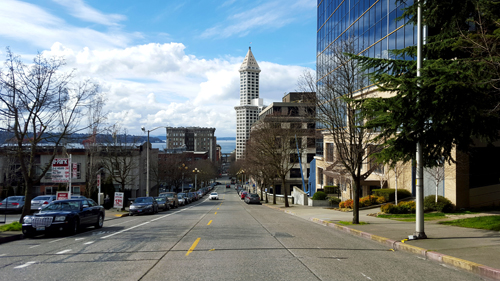By Phuong Le
Associated Press

On March 3, the U.S. Chamber of Commerce sued the City of Seattle over a new law that allows drivers of ridehailing companies to unionize over pay and working conditions. Many of these drivers are immigrants. (Photo by Stacy Nguyen/NWAW)
SEATTLE (AP) — The U.S. Chamber of Commerce, on March 3, sued the city of Seattle over a new law that allows drivers of ride-hailing companies such as Uber and Lyft to unionize over pay and working conditions.
The “unprecedented” ordinance violates federal antitrust law and is pre-empted by federal law, the lawsuit filed in federal court in Seattle argues. It also says the ordinance illegally allows for-hire drivers to get together and set rates and restricts the freedom of independent contractors.
The law “will burden innovation, increase prices, and reduce quality and services for consumers,” said the chamber, a Washington, D.C.-based organization that represents more than 3 million businesses.
In December, Seattle became the first city in the U.S. to allow drivers of taxis, for-hire transportation companies and app-based ride-hailing services to bargain with their employers, if a majority shows they want to be represented by a union. Drivers would be represented by nonprofit organizations certified by the city.
A spokeswoman for the Seattle City Attorney said March 3 that the office is reviewing the complaint and will file a response with the court.
The bill’s main sponsor, Councilman Mike O’Brien, had said he wanted to make sure workers had access to good-paying jobs. He noted that many drivers in Seattle are immigrants who depend on full-time work, but some make less than minimum wage and lack basic worker rights, such as sick leave and protection from retaliation.
The bill passed on an 8–0 vote, and it became law despite the mayor declining to sign it.
There’s good reason that none of the thousands of other municipalities have tried to authorize collective bargaining by independent contractors, the chamber said about its lawsuit, arguing that the ordinance violates the National Labor Relations Act and federal anti-trust laws, among others.
“This ordinance threatens the ability not just of Seattle, but of every community across the country, to grow with and benefit from our evolving economy,” Amanda Eversole, who is president of the group’s Center for Advanced Technology and Innovation, said in a written statement.
San Francisco-based Lyft and others had urged the mayor and council to reconsider the measure and listen to those who seek the flexible economic opportunity the company offers.
An Uber spokeswoman said in a statement that the group’s lawsuit “raised serious questions not only about whether the city has run afoul of federal laws, but also about the impact on drivers who rely on ridesharing to earn flexible income.” (end)



